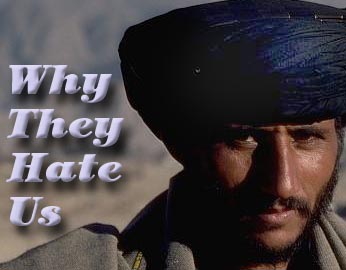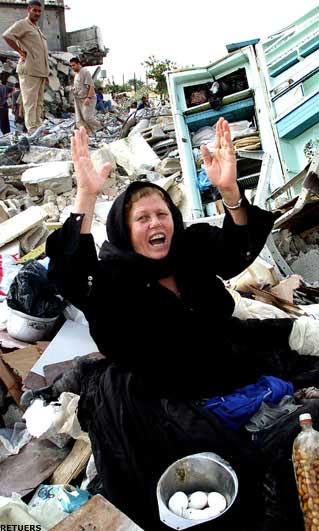
|
Exclusive MONITOR Series |

|
 |
|
|
A
week after the World Trade Center/Pentagon attack, President Bush stood
before a joint session of Congress and
TV cameras that beamed his words and image around the globe.
"Americans are asking, 'Why do they hate us?'" He said.
"They hate what they see right here in this chamber: a democratically
elected government. Their leaders are self-appointed. They hate our
freedoms: our freedom of religion, our freedom of speech, our freedom to
vote and assemble and disagree with each other."
It was a statement that must have dumfounded millions of people in the West Bank, Islamabad, Tehran, Baghdad, Jakarta, and elsewhere in the Muslim world. For decades, people there have asked a mirror of that question: "Why does America hate us?" What we need most now is an understanding of history. America doesn't have many close friends in the Muslim world, and we really have no one to blame but ourselves. When you review the history of the last fifty years, a shameful picture of U.S. foreign policy emerges. In that time, we have repeatedly worked against the best interests of both the people of the other country and ourselves by propping up anti-democratic regimes. The U.S. has:
|
|
But
some Muslim countries had a treasure even greater than a strategic location that we could use against the Soviets. Under their lands were unlimited deposits of oil. Some also had deep, warm-water seaports that could welcome great ships. The only problem was that none of it belonged to the Americans, or Europeans, or Russians who desperately wanted ownership.
The early part of the 20th century witnessed new flags flying over Muslim countries in the Middle East and Central Asia. Italy had invaded Libya; the French held Lebanon, Syria, Algeria and two other North Africa countries; the British claimed Egypt, Iraq, Palestine, and almost everything else. England and France decided between themselves where the new national borders would fall, and then decided on who would rule the nations. The borders that they drew did not always make commonsense; the dividing line between Afghanistan and what's now northwest Pakistan split apart the ancient territory for the Pashtuns, a single ethnic group. Nor did were the rulers chosen that wisely; they appointed a Saudi as the new monarch for Jordan. But the real goal of the Europeans was to make sure these countries were small states totally under their control -- virtual colonies, dependent upon Europe for banking, technology, defense, and every other need. In return, Europeans expected the right to pillage the colonies as they pleased. In 1920, England and France struck a secret deal that was intended to give them a complete monopoly on all oil from the Middle East. The Europeans also installed governments that were comfortable shadows of themselves. The British, who dominated most of the region, usually created monarchies. A recent book by historian David Cannadine, "Ornamentalism: How the British saw their Empire," shows that they always also created a rigid class structure like their own. Even in cultures that had been dominated by tribal conflicts, now one group was granted dominance and high social prestige. Many of these countries became independent before and after WWII (a few via coup or revolution), with Britain granting independence to the last in the 1970s. But the change was largely cosmetic; countries were still dependent upon the Europeans, tied to them via commerce and treaties that ensured that the oil would still flow through British and French pipelines. With colonial rule still a vivid memory for many, it's understandable that Muslims are uneasy about a new, aggressive U.S. presence, invited by their own governments or no. One hundred years later the prizes are still oil deposits and deep seaports, and the West still wants them. More than ever. And no country is as thirsty for oil as America. There's no better example of America's folly than our misadventures in Iran, the fourth-largest oil producer in the world. We created, then nurtured a puppet government infamous for its well-documented cruelty, and when the regime was toppled by a popular uprising, we were mystified that the new leaders hated us and blamed the U.S. for decades of misery. But we Americans were only the latest Western nation to treat Iran like a colony; for more than a century, Iran and the other Islamic nations in the Middle East and Central Asia were pushed around by the great (and some not-so-great) powers. To be a Muslim in these countries is to understand what it feels like to be on the losing side of imperialism. Almost every American associates Iran with the hostage crisis -- 444 days of national anguish, waiting helplessly for our citizens to be released. But afterward, while America was nursing wounded pride and pretending that "rogue state" Iran didn't exist, Ayatollah Khomeini was spreading his fundamentalist revolution worldwide. That we didn't pay close attention to these developments was folly that led directly to the horror of September 11, 2001. "I can in one week assemble 500 faithful ready to throw themselves into suicide operations," said one leader of the militant youth that rushed to Tehran to join the jihad against the West and secular Islamic governments.
|
|
 Make
no mistake: a significant reason why we have few friends in the world of Islam is because U.S. misadventures are not forgotten in places like Afghanistan, Iran, Iraq, and Indonesia. It's not that their memories are so long -- it's that our own memory is so poor.
Make
no mistake: a significant reason why we have few friends in the world of Islam is because U.S. misadventures are not forgotten in places like Afghanistan, Iran, Iraq, and Indonesia. It's not that their memories are so long -- it's that our own memory is so poor.
Part of that blame goes to the American media, which provides scant international news coverage. Most newspapers and magazines closed their foreign desks during 1980s budget cutbacks (see MONITOR story), conceding breaking news coverage to TV. As a result, we usually don't hear news from outside the U.S. unless it's big news that plays well on small television screens -- warfare and famine. Thus when a story like the Sept. 11 terrorism captures the headlines, all background leading to the events are unknown. It's a sad comment on our ignorance that the White House spent considerable time after the attack reassuring Americans that every Muslim is not a bin Laden conspirator. What international news that does appear in U.S. mainstream press is usually notoriously one-sided and at the mercy of corporate/government interests adept at media spin. Maybe the most notorious example of this kind of manipulation was seen shortly before the Gulf War, as a 15 year-old girl told Congress that heartless Iraqi soldiers were dumping premature Kuwaiti infants out of their hospital incubators. It was later revealed that the story was a complete fake, cooked up by U.S. PR firm Hill & Knowlton (see "Lies, Damn Lies and the PR Industry"). That kind of outright lie is rare. More common is subtle pressure to mold coverage towards their interests, and no business or government is more adept at this than the nation of Israel. Journalist and editor Maggy Zanger wrote a ground-breaking article earlier this year about Israel's propaganda machine that "cranks out reams of paper, faxed reports, e-mailed press releases, videotapes of Palestinian violence, and lists of government and academic sources ready to provide a well-packaged sound bite." Israel makes it easy for reporters to churn out a story. As an example, she quotes the Washington Post's Keith Richburg: "The minute an Israeli is killed you've got their whole biography being faxed over to you." The results show; the name and circumstance of Israeli deaths appear widely in the U.S. press, while killed Palestinians are rarely identified -- except as anti-Israel terrorists. So successful is the media campaign that U.S. reporters have to fight their own editors:
Cox News Service correspondent Larry Kaplow had to convince his editors about Israel's lethal use of force early on in the intifadah, which resulted in a high number of Palestinian deaths. "I started writing e-mails back saying, 'Look, you know, I didn't believe this at first either,'" says Kaplow. "It doesn't do any good to reinforce the conventional wisdom. I mean, what are people learning?" But while Americans view the conflict through Israel's lens, the Islamic world sees a different picture from Al-Jazeera, the "Arab CNN" which gives prominent daily coverage to the Palestinian uprising. Their viewers witness at close hand the drama of life in the West Bank and Gaza today: Palestinian homes destroyed by army bulldozers, orchards uprooted, the wail of mourning parents and widows. They also hear from Washington statements of indifference to the brutality, particularly since the presidency of George W. Bush began. Americans would do well to know more about the Israel - Palestine war, but again, our ignorance of events in other countries betrays us; where do you start learning about such a complicated history? Simply understanding a daily news report can be as difficult as opening a 2,000 page book to a middle chapter and expecting to make sense of it.
But this glimpse of the war is also quite typical of the long war. Ever day Israelis and Palestinians die and are injured -- although chances were far greater that the victim was Palestinian (in the last year, over four times as many Palestinians have died than Israelis). Ever day Palestinian houses are razed, and shots are fired at the Israeli enclaves in Gaza and the West Bank. Every day that this continues, Palestinian hatred towards the U.S. grows for our refusal to rein in our favored nation. And every day, further resentment towards America grows as well among the vast Islamic audience of Al-Jazeera.
| |||||